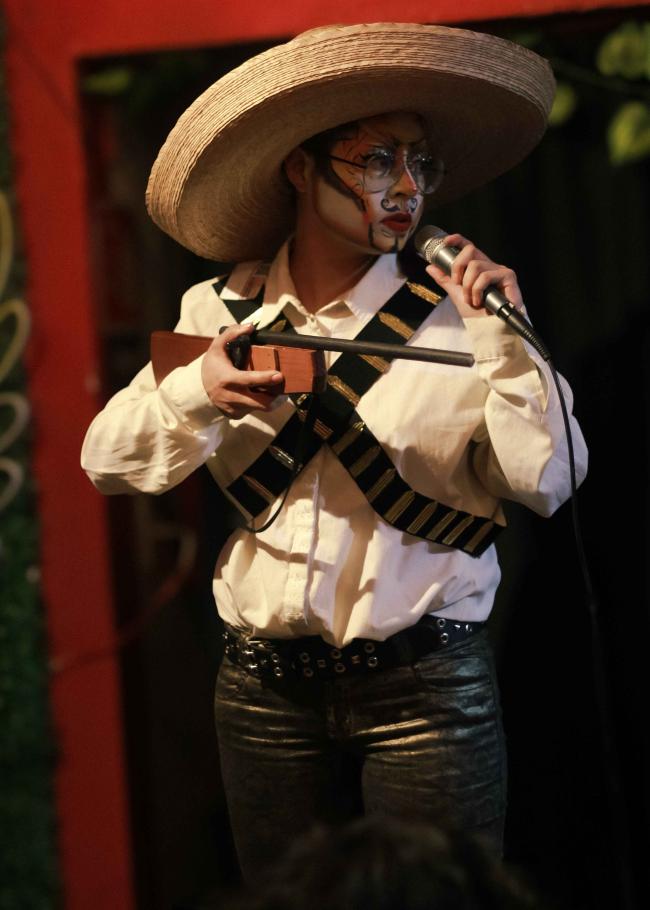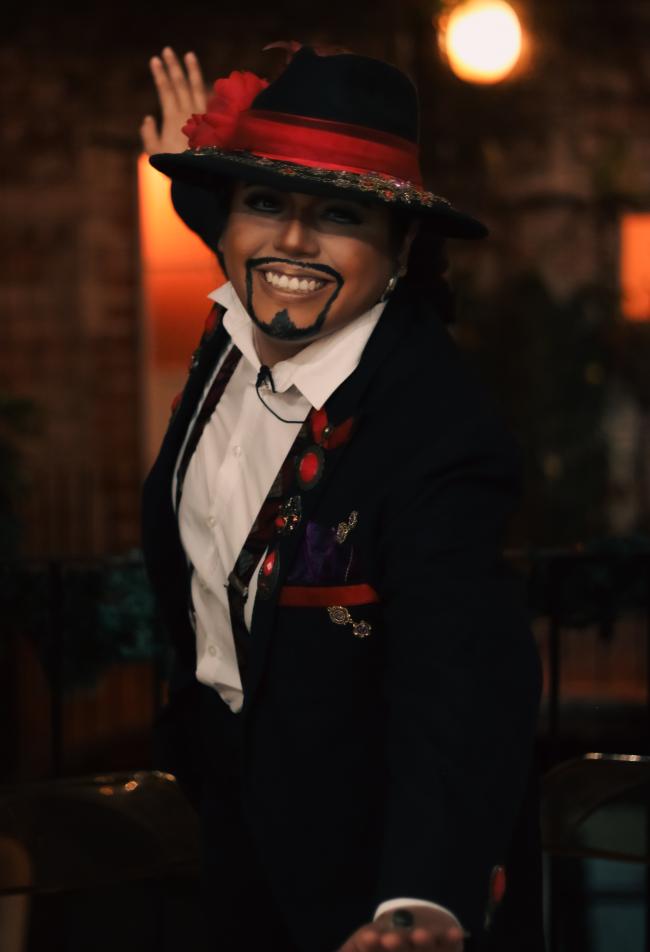
In the cozy ambience of Agora Cafe, drag artists in costume read poetry, perform stand-up comedy, sing, and dance, for an audience strewn around the cafe at tables and on the carpet. On this particular night in January, the coffee shop and queer community space in Mexico City hosted a show dedicated to the legacy of Amelio Robles, a colonel during the Mexican Revolution and one of the country’s earliest transgender icons.
The show, conceived by Gabriel Drag King as part of a series of drag king nights featuring local artists, sought not only to celebrate but also to dissect the life of Robles, a leader who gained recognition as one of the Mexican Revolution’s heroes only after a long fight with the state. Robles, who faced discrimination his entire life, has a complicated legacy. Originally celebrated as a feminist icon, Robles has been reclaimed by the queer community even as the more toxic means through which he expressed his masculinity have been rejected.
Through their performances, the drag kings reflected on the life and legacy of one of Mexico’s most underappreciated heroes. Putting themselves in his shoes, they drew connections between his struggle and the struggle of trans and queer people today.
A Remarkable Life
Assigned female at birth, Amelio Robles Avila was born in 1889 in the Mexican state of Guerrero. When he initially joined the Mexican Revolution in 1912, he presented as feminine, something which would not have been out of the ordinary at the time. Many women participated in the army in supporting roles for soldiers, or disguised themselves as men to fight. Soon after, however, Robles began to present as a man, wearing the attire of male soldiers and becoming known as Zapatista Colonel Amelio Robles Avila.
Robles quickly became an important leader in the Revolution. He did so by adhering to many of the era’s ideals of masculinity. He was known to drink alcohol, sleep with women, and shoot well. He also was said to threaten to shoot anyone who suggested he was not a man.
After leaving the army, Robles met Ángela Torres in the Mexican state of Guerrero, where they married and adopted a daughter. The fact that Robles successfully married Torres in a country that did not at the time allow for same-sex marriage indicates that he was largely seen and accepted as a man. Nevertheless, Robles had to forge a birth certificate to prove his gender, and reportedly continued to threaten anyone who doubted his gender.
It took decades for Robles to get the formal recognition that he deserved. The military finally validated his identity as a man, and gave him a veteran’s pension and medals shortly before his death in 1984 at the age of 95. While the institutional acceptance of his gender was partly due to his privileged upbringing and connections with government officials, it was in large part the result of his lifelong fight to be recognized and his refusal to hide his identity.
A Controversial Legacy Dissected in Drag
After his death, Robles began to be labeled a feminist icon, a symbol of women who fought in the Mexican Revolution-erasing the gender he openly lived nearly his whole life. Historians ignored his lived reality by holding up his story as that of an empowered woman who fought against the patriarchy. A museum was even founded under his birth name, using feminine grammar to describe him.
In recent years, Mexico’s queer community has reclaimed his story and highlighted his journey as a trans man. According to Gabriel Drag King, it was the visibility of transmasculine figures like Robles that the show at Agora Cafe intended to reclaim.
During the performance, Gabriel Drag King read an original poem based on a text by Dr. Roxana Curiel about Amelio Robles. The poem points out that, although his transition was considered successful and Robles maintained his identity until the end of his life, part of this success was based in a masculinity we would now label “toxic.” Robles abused his partners and often got into fights with other men.
The poem connects this theme of violence to the violence queer people face today, naming queer and trans activists who have been murdered in recent years. “My poetry is a social denunciation of hate crimes… this fight is current,” said Gabriel Drag King. They called the poem a “connection between the fights of yesterday and today.”
The poem also expresses a hope that by surrounding ourselves with the diverse types of masculinity that exist in the world, we can develop a concept of masculinity outside of violent stereotypes.
Axel D. Poppers, a gender fluid performer, chose to represent themes linked to the experience of body dysmorphia. Though they did not identify with some of the “typically masculine” themes of Robles’ story, they explained, feelings of dysphoria and struggles around identity and expression are often relatable for trans and gender fluid people. ”It’s important to talk about it,” they said.
The artist Hypatia performed a dance to a song about hidden love, connecting it to Robles’ story through the “wound of invisibility as a queer person.” As is the case with many queer people, though Robles was largely recognized as a man, there were still many things that he could not do freely. The performance was also a dialogue about the ways in which the story of Robles had been revised by those claiming him as a hero of women’s history. For Hypatia, this performance was a way of symbolically reconciling the clash between Robles’ status as both a feminist and trans icon. “In thinking about what wounds we share, we have more in common than what divides us,” she said.
Hypatia’s second performance explored themes of childhood and Three Kings Day, a holiday that had recently passed when children in Mexico receive gifts. Hypatia played one of the Kings reading a child’s letter requesting the gift of changing their name to Amelio. The King offers credentials and official identification documents—poking fun at the absurdity of the idea that having a particular document validates a person's existence.
Bringing out her childhood teddy bear, Hypatia then questioned what childhood would be like if children could be allowed to express and play with their gender, and find their own balance. “It’s never too late to keep playing with gender,” said Hypatia. “We can keep rethinking, reconstructing and keep questioning. Just like a child: they question everything.”
“We’re Not that Far from What Happened in History”
In another performance, the artist known as Astrokink read a letter that they wrote from the perspective of a childhood friend of Robles. The letter imagined the difficulty of living as a trans person during the Mexican Revolution, and the oppressive influence of the Church in how identity could be expressed.
“I wrote the letter putting myself in the skin of this person,” said Astrokink in an interview after their performance. “What would I have done if I lived in that era?” Astrokink also pointed out that there remain continuities. Given the struggles that queer communities have endured and continue to endure, “we’re not very far from what happened in history.”
Gabriel Drag King emphasized that the show is part of an effort to re-label history, to correct it by revising it from a trans perspective. “There has been a lot of revision against diverse identities,” they said. “But we can come back, and look at the old with new eyes.”

Just as Robles struggled for the recognition of his identity, Gabriel Drag King says that they are waging a struggle for a wider visibility of drag kings, as well as more inclusive spaces for diverse identities and narratives. A team of local filmmakers is even creating a documentary about Mexico City drag kings, aiming to bring more attention to these artists and highlight the challenges they face, like discrimination even within the queer community.
“Trans people did not just invent themselves, they’re not part of a ‘woke’ trend,” says Gabriel Drag King. “Fighting for the rights of trans masculine people today, it’s part of the history of this country.” At a time when the rights of trans people are under attack, in Mexico and around the world, that fight has never been more important.
Olivia Ferrari is a New York City-based freelance journalist with a background in research and science communication. Olivia has lived and worked in the U.K., Costa Rica, Panama and Colombia. Her writing focuses on wildlife, environmental justice, climate change, and social science.
The author would like to thank the documentary team that shared the photos of the event. This includes Cora Regina Amador González (director), Brandon Galván Blanco (producer), Nasheli Garcés (audio and production assistant), and Alexis Rendón (director of cameras and photograph).

